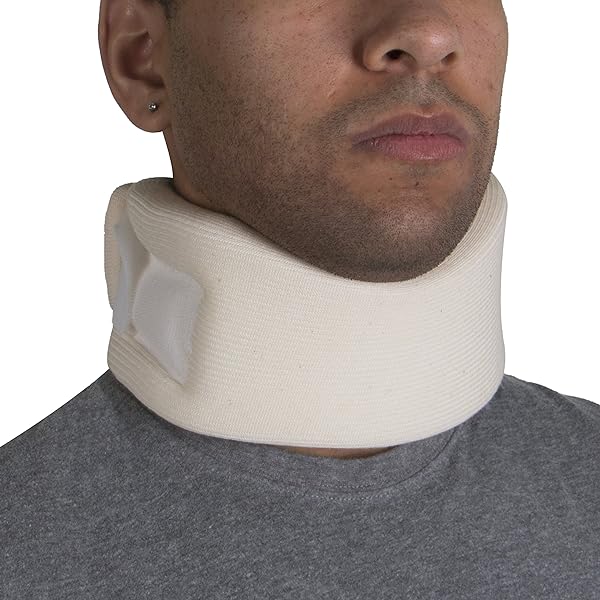As a retired man in my 60s, I’ve had my fair share of aches and pains, but nothing has been quite as persistent and troublesome as neck pain.
Over the years, I’ve tried various remedies, from physical therapy to home exercises, but finding the right neck brace has made a world of difference in my daily comfort and quality of life.
In this article, I want to share my positive experiences with some of the most comfortable neck braces I’ve discovered. Whether you’re dealing with chronic neck pain, recovering from an injury, or simply looking for some extra support, I hope my insights can help you find the relief you need.
Most Comfortable Neck Braces
1. CerviCorrect Neck Brace
The CerviCorrect Neck Brace is a versatile cervical collar designed to provide support and pain relief for individuals suffering from neck pain, snoring, or minor neck injuries. It is suitable for both men and women and offers a comfortable and adjustable fit.
Pros
- Multi-Functional: Designed to help with neck pain relief, snoring reduction, and cervical spine stabilization.
- Comfortable Material: Made from soft, breathable materials that ensure comfort during extended wear.
- Adjustable Fit: Features a wrap-around design with adjustable straps for a customized and secure fit.
- Lightweight and Portable: Easy to wear and carry, making it suitable for use at home or while traveling.
Cons
- Limited Support: Provides less support compared to rigid braces, making it unsuitable for severe injuries or post-surgical recovery.
- Durability: The soft materials may wear out over time, requiring replacement for continued effectiveness.
2. Velpeau Neck Brace
The Velpeau Neck Brace is designed to provide support and pain relief for individuals suffering from neck injuries or conditions such as whiplash. It comes in three versions: Comfort, Dual-use, and Enhanced, each offering varying levels of support and comfort.
Pros
- Comfortable Design: The Comfort version prioritizes softness and comfort, making it suitable for extended wear, including during sleep.
- Adjustable Support: The Dual-use version includes a removable external flexible plastic support plate for enhanced support.
- High-Quality Materials: Made with breathable, latex-free materials that absorb sweat and keep the neck dry and odor-free.
- Ergonomic Fit: Features a “V” shape under the jaw and a curved rise at the back for a secure and comfortable fit.
- Customizable Tightness: The hook and loop design allows for adjustable tightness to prevent unwanted movement and pain.
Cons
- Limited Sizes: Special sizes are only available in the Comfort version.
- Care Instructions: Requires careful handling when washing; cannot be wrung dry or exposed directly to the sun.
3. Miami J Collar
The Miami J Collar is a rigid neck brace designed for individuals with serious neck injuries or post-surgical recovery. It is known for its superior immobilization and comfort.
Pros
- High-Quality Support: Provides excellent immobilization for the cervical spine, making it ideal for post-trauma and post-surgical recovery.
- Antibacterial Padding: Features Sorbatex padding that is 100% antibacterial, reducing the risk of infections.
- Versatile Design: The Miami JTO thoracic extension offers additional support for high-thoracic and cervical injuries.
- Adjustable Fit: Designed with adjustable panels for a customized fit, ensuring optimal support and comfort.
Cons
- Rigid Structure: The rigid design may limit mobility more than soft braces, which could be uncomfortable for some users.
- Higher Cost: Generally more expensive than soft neck braces, which might be a consideration for budget-conscious users.
4. Push Care Neck Brace
The Push Care Neck Brace is a soft neck brace designed to provide moderate support and pain relief for individuals with neck pain or minor injuries. It is known for its comfort and ease of use, making it suitable for daily wear.
Pros
- Comfortable Design: Made with soft, breathable materials that ensure comfort during extended wear.
- Adjustable Fit: Features an adjustable Velcro strap that allows for a customized fit, ensuring the brace stays securely in place.
- Lightweight: Its lightweight design makes it easy to wear throughout the day without causing discomfort.
- Affordable: Priced reasonably, making it accessible for a wide range of users.
Cons
- Limited Support: Provides less support compared to rigid braces, making it unsuitable for severe injuries or post-surgical recovery.
- Durability: May not be as durable as rigid braces, especially with prolonged use.
5. SoftSense Neck Brace
The SoftSense Neck Brace is a soft foam cervical collar designed to provide neck pain relief and support. It is particularly suitable for sleeping and daily wear, offering comfort and stability for individuals with minor neck injuries or chronic neck pain.
Pros
- Comfortable Material: Made from soft foam that provides gentle support and comfort, making it ideal for extended wear, including during sleep.
- Pain Relief: Helps relieve pain and pressure in the spine by keeping the vertebrae stable and aligned.
- Breathable Design: The material is breathable, which helps keep the neck cool and dry.
- Easy to Use: Simple wrap-around design with Velcro closure for easy application and adjustment.
Cons
- Limited Support: Ineffective for severe injuries or post-surgical recovery.
- Durability: Foam material may compress over time, reducing its effectiveness and requiring replacement.
FAQs
1. What are the different types of neck braces available?
There are three main types of neck braces:
- Soft Collars: Made from foam rubber or similar materials, these provide gentle support and allow for some movement. They are typically used for minor injuries, chronic neck pain, or as a night resting collar.
- Rigid Collars: These are made from hard plastic and foam, providing significant support and restricting almost all neck movement. They are used for severe injuries, post-surgical recovery, or spinal fractures.
- Cervical-Thoracic Braces: These braces extend to the upper back and are used for more extensive injuries involving both the neck and upper spine.
2. How long should I wear a neck brace?
The duration for wearing a neck brace depends on the severity of your injury and your doctor’s recommendations:
- Soft Collars: Typically worn for short-term relief from minor injuries or chronic pain.
- Rigid Collars: Often required for up to 12 weeks post-surgery or for severe injuries to ensure proper healing.
3. Can I sleep with my neck brace on?
Yes, it is often recommended to sleep with your neck brace on, especially if you are recovering from surgery or a severe injury. It helps maintain proper alignment and prevents further injury. However, you should avoid using pillows that bend your neck and try to sleep in a neutral position.
4. How do I clean my neck brace?
Most neck braces come with removable pads that can be washed by hand using mild detergent. Ensure the pads are thoroughly dry before reattaching them to the brace. The brace itself can be wiped down with a damp cloth.
5. Can I drive while wearing a neck brace?
No, you should not drive while wearing a neck brace, especially a rigid collar, as it restricts your neck movement and can impair your ability to drive safely. Typically, you will need to avoid driving for up to three months if you are required to wear a cervical collar.
6. What should I do if my neck brace causes skin irritation?
If you experience skin irritation, ensure that the brace is fitted correctly and not too tight. Clean the pads regularly and keep your skin dry. If irritation persists, consult your healthcare provider for further advice.
7. Can I shower with my neck brace on?
You should not shower with your neck brace on unless you have a specific shower collar. Typically, you can remove the brace briefly to shower, but ensure you follow your doctor’s instructions and reapply the brace immediately after drying off.
8. What activities should I avoid while wearing a neck brace?
Avoid strenuous activities, heavy lifting, and any movements that could strain your neck. Gentle movements like walking are encouraged to prevent muscle stiffness, but always follow your doctor’s specific recommendations.
9. How do I ensure my neck brace fits correctly?
Your neck brace should be snug but comfortable. It should restrict movement without causing pain or discomfort. If the brace feels too tight or too loose, consult your healthcare provider for adjustments.
10. Will I need physical therapy after wearing a neck brace?
Physical therapy may be recommended after you stop wearing a neck brace to help strengthen your neck muscles and improve mobility. Your doctor will advise you based on your specific condition and recovery progress.



